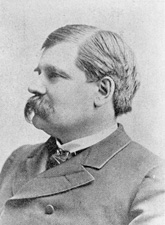Dwight Sabin | |
|---|---|
 | |
| Chair of the Republican National Committee | |
| In office December 21, 1883 – June 6, 1884 | |
| Preceded by | Marshall Jewell |
| Succeeded by | Benjamin Jones |
| United States Senator from Minnesota | |
| In office March 4, 1883 – March 3, 1889 | |
| Preceded by | William Windom |
| Succeeded by | William D. Washburn |
| Member of the Minnesota House of Representatives from the 22nd district 23rd (1883–1884) | |
| Member of the Minnesota House of Representatives from the 22nd district 22nd (1881–1882) | |
| Member of the Minnesota House of Representatives from the 22nd district 20th (1878–1879) | |
| Member of the Minnesota Senate from the 22nd district 15th (1873–1874) | |
| Member of the Minnesota Senate from the 22nd district 14th (1872–1873) | |
| Member of the Minnesota Senate from the 2nd district 13th (1871–1872) | |
| Personal details | |
| Born | Dwight May Sabin April 25, 1843 Marseilles, Illinois, U.S. |
| Died | December 22, 1902 (aged 59) Chicago, Illinois, U.S. |
| Political party | Republican |
| Military service | |
| Allegiance | United States • Union |
| Branch/service | Union Army |
| Battles/wars | American Civil War |
Dwight May Sabin (April 25, 1843 – December 22, 1902) was an American politician who served as U.S. Senator from Minnesota and in the Minnesota Legislature. He is known for the business ventures of Seymour, Sabin & Co. and the Northwestern Car Company, highly successful enterprises dependent on the highly profitable prison labor contracts he had negotiated with the Minnesota State Government in the 1870s. His election to federal office, in 1883, came following an infamous prolonged dead-lock in the Minnesota State Senate, during which incumbent Senator William Windom failed of re-election[1] following "the worst campaign in the known history of the state."[2]